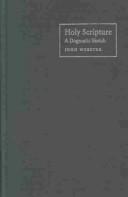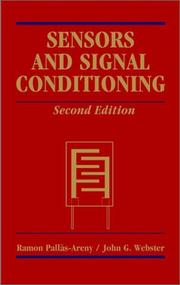| Listing 1 - 5 of 5 |
Sort by
|

ISBN: 1107138973 1107385903 1280420154 0511808186 0511180500 0511062974 0511204574 0511307403 0511071434 9780511062971 9780511071430 9780511204579 9780511808180 0521831180 0521538467 9780521831185 9780521538466 9786610420155 6610420157 9781107138971 9781107385900 9781280420153 9780511180507 9780511307409 Year: 2007 Publisher: Cambridge Cambridge University press
Abstract | Keywords | Export | Availability | Bookmark
 Loading...
Loading...Choose an application
- Reference Manager
- EndNote
- RefWorks (Direct export to RefWorks)
May we speak, in the present age, of holy scripture? And what validation of that claim can be offered, robust enough to hold good for both religious practice and intellectual enquiry? John Webster argues that while any understanding of scripture must subject it to proper textual and historical interrogation, it is necessary at the same time to acknowledge the special character of scriptural writing. His 2003 book is an exercise in Christian dogmatics, a loud reaffirmation of the triune God at the heart of a scripture-based Christianity. But it is written with intellectual rigour by a theologian who understands the currents of modern secular thought and is able to work from them towards a constructive position on biblical authority. It will resonate with anyone who has wondered or worried about the grounds on which we may validly regard the Bible as God's direct communication with humanity.
Bible --- Evidences, authority, etc. --- 22.013 --- 22.013 Bijbel: geloofwaardigheid; inerrantie --- Bijbel: geloofwaardigheid; inerrantie --- Biblia --- 22.012 --- 231.742.2 --- 231.742.2 Openbaring en Heilige Schrift --- Openbaring en Heilige Schrift --- Bijbel: goddelijke inspiratie --- Arts and Humanities --- Religion
Book
ISBN: 177541423X 9781775414230 1775566811 9781775566816 Year: 2009 Publisher: [Auckland, N.Z.] Floating Press
Abstract | Keywords | Export | Availability | Bookmark
 Loading...
Loading...Choose an application
- Reference Manager
- EndNote
- RefWorks (Direct export to RefWorks)
Shakespeare may get the lion's share of attention when it comes to early modern playwrights, but critics regard the era as something of a golden age of drama. John Webster's
Book
ISBN: 0429842945 0429453515 0429842937 9780429453519 9780429842931 9781138317239 1138317233 Year: 2018 Publisher: Abingdon, Oxon
Abstract | Keywords | Export | Availability | Bookmark
 Loading...
Loading...Choose an application
- Reference Manager
- EndNote
- RefWorks (Direct export to RefWorks)
This is a new edition of Dr. Webster's, The Nirankari Sikhs (1979), which has been recognized as 'single most important work on the history of Baba Dayal and his successors'. It updates the earlier edition not only by dealing with the past forty years of Nirankari history but also by taking into account subsequent scholarship on the history of Sikhism, especially during the first half of the nineteenth century. Further, it also provides two additional primary sources of nineteenth century Nirankari history along with the nine included in the earlier edition.This new edition will be of value not only to those scholars interested in Nirankari history but also to those seeking a fuller understanding of the evolution of Sikh identity since the nineteenth century. Sikh identity has been a major issue for Nirankaris in recent decades because they have been confused with the Sant Nirankari Mandal which makes no claims to a Sikh identity. Nirankaris, like other Sikhs, base their beliefs and practices upon the Guru Granth Sahib and revere the ten Sikh gurus. For this reason they view themselves, and are considered by other Sikhs, to be minority group within Sikhism. They are distinguished from other Sikhs, most obviously in not fully embracing the Khalsa tradition of the Sikhs and in having a continuing hereditary line of human gurus. How such similarities and differences have affected their own, and the very nature of, Sikh identity over the past two centuries is an important part of this history.
Nirankaris. --- Sikhism. --- South Asia --- History.

ISBN: 0471332321 Year: 2001 Publisher: New York Wiley Interscience
Abstract | Keywords | Export | Availability | Bookmark
 Loading...
Loading...Choose an application
- Reference Manager
- EndNote
- RefWorks (Direct export to RefWorks)
Detectors --- Interface circuits --- Transducers
Book
ISBN: 128175806X 9786611758066 1435664671 9546424269 9781435664678 9781281758064 6611758062 9789546424266 9546423246 9789546423245 Year: 2008 Publisher: Sofia, Bulgaria Pensoft
Abstract | Keywords | Export | Availability | Bookmark
 Loading...
Loading...Choose an application
- Reference Manager
- EndNote
- RefWorks (Direct export to RefWorks)
| Listing 1 - 5 of 5 |
Sort by
|

 Search
Search Feedback
Feedback About UniCat
About UniCat  Help
Help News
News